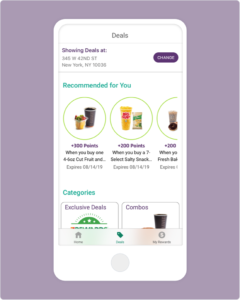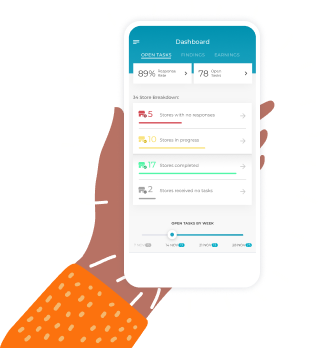With its expansive U.S. location count of 11,800, 7-Eleven dominates the convenience landscape. Beginning at its launch 92 years ago, the retailer has made the most of all sorts of innovations in order to establish and maintain its spot at the top.
In 1927, it created the first iteration of the modern convenience store by offering staples such as bread, milk, and eggs from an ice chest in the front of the gas station. Later, not only did 7-Eleven launch the first self-service soda fountains and gas pumps, it was also the first c-store to install self-service banking—an ATM.
Since its inception, technological risk-taking has been a mainstay at 7-Eleven. Below, we’ll share how the mega-chain is continuing this tradition today.
7-Eleven Express
Last year, the convenience retailer began testing high-tech vending machine-style convenience stores in South Korea. The concept, called 7-Eleven Express, is a full self-service c-store containing five vending machines that sell 200 products.
The products in-store, priced in line with traditional brick-and-mortar 7-Eleven’s, are divided across five main categories: drinks, snacks, prepared meals, processed food, and non-food products. To purchase an item, consumers can either input the product number into the vending machine, or select the item they’d like from a central kiosk. The stores do not accept cash—customers can pay with a prepaid transit card or credit card. Eventually, consumers may even be able to purchase from 7-Eleven’s own c-store app, 7Rewards.
7-Eleven Express is a means to combat cashier-less Amazon Go stores encroaching on its market share. By cutting down on labor costs, the new store offers an opportunity to widen margins in an industry where they’re traditionally very slim. Given the robust sales so far, customers seem to be appreciating the speed, convenience, and hip technological ambiance that the stores offer.
7Rewards
Recently, 7-Eleven began extending convenience beyond its brick-and-mortar locations and onto customer’s mobile devices. To do so, it revamped 7Rewards, it’s proprietary c-store app.
The app-based loyalty program incentivizes customers to earn points by purchasing food and drinks. To make the app engaging and fun, 7-Eleven uses gamification to give customers the opportunity to earn bonus points by purchasing promoted items. To discover which items are on promotion, customers must open the app to see what’s available in their region, with the results depending on time of day and purchase history.
Although the app underwent several changes and improvements, 7-Eleven maintained its most signature features. For instance, both presently, and when the app launched in 2015, every 7th beverage served in a 7-Eleven cup is free.

Broadly, the app’s innovations are centered on expanding promoted products and enhancing personalization. In doing so, 7-Eleven can drive sales and awareness to new and potentially overlooked products. Meanwhile, the app provides the right promotion at the right time based on a range of factors such as location, shopping habits, and demographics.
Mobile Payment Options
-
Scan & Pay
Once again, 7-Eleven places itself at the forefront of technology—it’s now become the first c-store chain to develop and implement frictionless checkout. Shoppers using 7Rewards can seamlessly purchase any in-store item that doesn’t require cashier assistance (eg: hot foods) or have an age limit (eg: tobacco). To complete the transaction, one only needs to scan the item in 7Rewards using their payment-connected smartphone.
Not only does this reduce labor costs, it drives customer convenience. Instead of having to potentially wait in line in-store, customers can easily select the items they want and be right back on their way. As self-checkout has proliferated in larger retail stores such as grocers and home goods, it makes sense that it would spread to c-stores as well. While the 7-Eleven stores currently utilizing this technology are located in Dallas, we can expect them to spread should there be successful customer adoption.
-
Google & Apple Pay
In another effort to reduce purchase friction and increase convenience for shoppers,, 7-Eleven added to its selection of contactless mobile wallets. The two most recent additions, Google Pay and Apple Pay, allow customers to pay by simply tapping or displaying their phones to a contactless-enabled reader.
This payments innovation brings 7-Eleven to the forefront of digital payments while also increasing the security and privacy of customers’ credit cards. Actual credit card numbers aren’t needed for transactions, nor are they stored on the device or the mobile wallet servers.
7Now Delivery App
Knowing that convenience and speed are cornerstones of the brand’s identity, in 2017, the retailer rolled out another proprietary c-store app, 7Now. Initially only in select markets, the app is now available nationwide. 7Now extends 7-Eleven’s reputation for convenience out of stores by delivering 7-Eleven products rights to shoppers’ doors—or, as recently announced, to anywhere a customer drops a 7Now Pin. Public park and beach slurpees abound!

Expanding on this convenience, the retailer also began offering beer through the app in 2018. The service is currently available in 18 markets including including New York; Los Angeles; Miami; San Francisco; Dallas and Austin, Texas; Seattle; Chicago; and Charlotte, N.C. In making this c-store app available, 7-Eleven is extending their brand beyond its physical locations to wherever their shoppers are in the moment.
7-Eleven Bot on Facebook Messenger
In rolling out the convenience industry’s first chatbot on Facebook Messenger, 7-Eleven aims to appeal to the chain’s “on-the-go, time-starved and digitally-reliant consumers” (read: millennials and Gen Z). Just like a store clerk, the chatbot helps users make the most of the 7Rewards program, locate nearby stores, and learn about discounts and offers.
Thanks to a combination of machine learning and artificial intelligence, the chatbot is in non-stop evolution mode. It constantly picks up conversational cues and learns customer preferences.
The decision to place the bot on Facebook Messenger makes sense. According to Hey Mojo, a chatbot software provider, nearly 30% of Americans are on Facebook messenger. The move signals that the industry is recognizing there’s greater opportunity to leverage existing platforms to connect with customers. Social media sites are some of the most highly trafficked worldwide. To the extent that retailers can have an engaging presence there, they have a greater opportunity to remain at top of mind.
Moving Beyond Convenience’s Four Walls
These latest innovations are proof that in order to be successful, c-stores need to move beyond their four walls and into other aspects of their customers’ lives. Digital devices are essentially borderless, and by utilizing a c-store app, machine learning, artificial intelligence, and automation, c-stores now possess the ability to provide convenience at the right place, at the right time.
CB4 helps convenience retailers like QuickChek, Circle K, and Dash In ensure that the products customers want most are easy to find and buy at every store in the chain. Ready to learn more? Here’s how it works.
Editors note: At CB4, we’re inspired by retail industry innovations and the brands leading the way. The retailers we highlight in our blog are not necessarily CB4 partners, but simply ones we find interesting and think you will, too.



